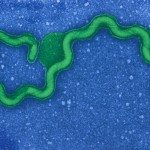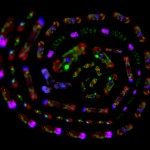Lien vers Pubmed [PMID] – 14680711
FEMS Microbiol. Lett. 2003 Dec;229(2):277-81
Toxin-antitoxin systems encoded by bacterial plasmids and chromosomes typically consist of a toxin that inhibits growth of the host cell and a specific antitoxin. In this report, the chpK gene from the chromosomal toxin-antitoxin locus of the spirochete Leptospira interrogans was studied in both prokaryotic and eukaryotic systems. Cloning of the the spirochetal chpK gene into a mycobacterial expressing vector led to dramatic reductions of transformation efficiency in both Mycobacterium smegmatis and Mycobacterium bovis BCG. However, few mycobacterial transformants were obtained. This result could be due to plasmid structural modifications leading to disruption of chpK expression, suggesting that L. interrogans ChpK is highly toxic for mycobacteria. Presence of the L. interrogans chpK gene was also found to inhibit cell growth of the yeast Saccharomyces cerevisiae. These results show that ChpK possesses a broad activity against both prokaryotes and eukaryotes, suggesting that the cellular target of the toxin is conserved in these organisms.


